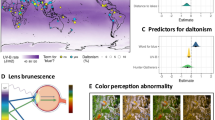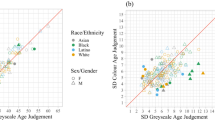Abstract
IN a previous communication1, it was shown that women with known colour-blind relatives were significantly more often red-green weak to a slight extent than women taken at random. This carried the implication that red-green blindness must be an incompletely recessive Mendelian character (although sex-linked), because a large proportion of the women with known colour-blind relatives must be heterozygous for that defect. Several later experiments have confirmed that conclusion, essentially the same results .being obtained with each new group tested.
This is a preview of subscription content, access via your institution
Access options
Subscribe to this journal
Receive 51 print issues and online access
$199.00 per year
only $3.90 per issue
Buy this article
- Purchase on Springer Link
- Instant access to full article PDF
Prices may be subject to local taxes which are calculated during checkout
Similar content being viewed by others
References
Pickford, R. W., Nature, 153, 409 (1944).
Vernon, P. E., and Straker, A., Nature, 152, 690 (1943).
Geddes, W. R., Brit. J. Psych., 37, 33 (1946).
Grieve, J., Nature, 157, 376 (1946).
Author information
Authors and Affiliations
Rights and permissions
About this article
Cite this article
PICKFORD, R. Sex Differences in Colour Vision. Nature 159, 606–607 (1947). https://doi.org/10.1038/159606b0
Issue Date:
DOI: https://doi.org/10.1038/159606b0
This article is cited by
-
Colour vision in ADHD: Part 1 - Testing the retinal dopaminergic hypothesis
Behavioral and Brain Functions (2014)
-
On the incidence of unilateral and bilateral colour blindness in heterozygous females
Human Genetics (1978)
-
Colour Vision of Heterozygotes for Sex-linked Red-Green Defects
Nature (1949)
Comments
By submitting a comment you agree to abide by our Terms and Community Guidelines. If you find something abusive or that does not comply with our terms or guidelines please flag it as inappropriate.



